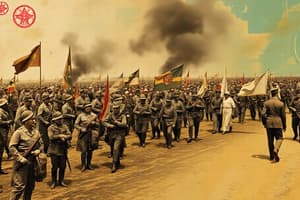Podcast
Questions and Answers
Which battle in 1916 resulted in horrendous casualties but brought neither side any significant strategic advantage?
Which battle in 1916 resulted in horrendous casualties but brought neither side any significant strategic advantage?
- Battle of Verdun (correct)
- Battle of Ypres
- Battle of Vimy Ridge
- Battle of Tannenberg
What was a consequence of the Brusilov Offensive in 1916 in the East during World War I?
What was a consequence of the Brusilov Offensive in 1916 in the East during World War I?
- It resulted in the creation of Czechoslovakia
- It was partly successful because of German forces being transferred to the Western Front (correct)
- It defeated the German forces in the East
- It led to the collapse of the Ottoman Empire
Which event marked the true end of World War I?
Which event marked the true end of World War I?
- 1918 armistice between Germany and the Allies
- Collapse of the Austro-Hungarian Empire
- Treaty of Versailles in 1919 (correct)
- Formation of the League of Nations
What significant shift in the global balance of power occurred as a consequence of World War I?
What significant shift in the global balance of power occurred as a consequence of World War I?
Apart from causing millions of military deaths, what other impact did World War I have on history?
Apart from causing millions of military deaths, what other impact did World War I have on history?
Flashcards are hidden until you start studying
Study Notes
World War I: A Global Conflict that Changed History
World War I, often referred to as the Great War or simply WWI, was a devastating conflict that spanned over four years, from 1914 to 1918. This unprecedented war involved multiple nations, leading to immense loss of life, social upheaval, and dramatic shifts in the global political landscape.
Origins and Causes
The roots of World War I can be traced back to a complex web of political, military, and diplomatic factors. The assassination of Archduke Franz Ferdinand of Austria-Hungary in Sarajevo in 1914 became the spark that ignited the war, but underlying tensions between imperial powers, the scramble for colonies, and shifting alliances were already present.
The alliance system, specifically the Triple Entente (France, Russia, and the United Kingdom) and the Triple Alliance (Germany, Austria-Hungary, and Italy), had led to a complex network of promises and obligations. When Austria-Hungary declared war on Serbia, Germany declared war on Russia, and France, fearing a two-front war, declared war on Germany.
Early Conflict and Fronts
The war began with a series of rapid advances and retreats, as armies tussled for territory on the Western Front (France-Belgium) and the Eastern Front (Russia-Austria-Hungary). The conflict quickly evolved into a war of attrition, characterized by the deployment of machine guns, trench warfare, and increasingly destructive weapons such as poison gas, flamethrowers, and airplanes.
On the Western Front, the Battle of Verdun (1916) and Battle of the Somme (1916) resulted in horrendous casualties, but brought neither side any significant strategic advantage. In the East, the Brusilov Offensive (1916) saw the Russian Army launch a successful offensive against Austria-Hungary, but the outcome was partly due to German forces being transferred to the Western Front.
Dynamic of War
Over time, World War I evolved into a global conflict, as the United States entered the war in 1917, and Ottoman Turkey and Bulgaria joined the Central Powers. The war also witnessed the birth of new nations, as the collapse of the Austro-Hungarian, Russian, and Ottoman empires resulted in the creation of Czechoslovakia, Poland, and Yugoslavia, respectively.
The war also brought about significant changes in the way nations fought, as governments took on a more active role in the conduct of war and began to mobilize resources for total war. The war also spurred significant technological developments, such as the use of tanks and mass air warfare.
Consequences and Legacy
The end of World War I is known for the 1918 armistice between Germany and the Allies, but the war's true end came with the signing of the Treaty of Versailles in 1919. The war resulted in over 9 million military deaths and 23 million wounded. The economic and social consequences of the war, such as the rise of nationalism, fascism, and communism, would have a profound impact on the course of history in the 20th century.
World War I also marked a significant shift in the global balance of power, as the United States emerged as a global superpower and Germany, Austria-Hungary, and the Ottoman Empire collapsed. The war also saw the creation of the League of Nations, a precursor to the United Nations, which aimed to prevent future conflicts.
Despite its terrible cost, World War I would ultimately pave the way for future global conflicts, but also bring about significant changes in the way nations interact, fight, and govern themselves. While its legacy is complex and contentious, it remains a pivotal event in world history, one that continues to captivate historians and fascinate students of warfare alike.
Studying That Suits You
Use AI to generate personalized quizzes and flashcards to suit your learning preferences.




